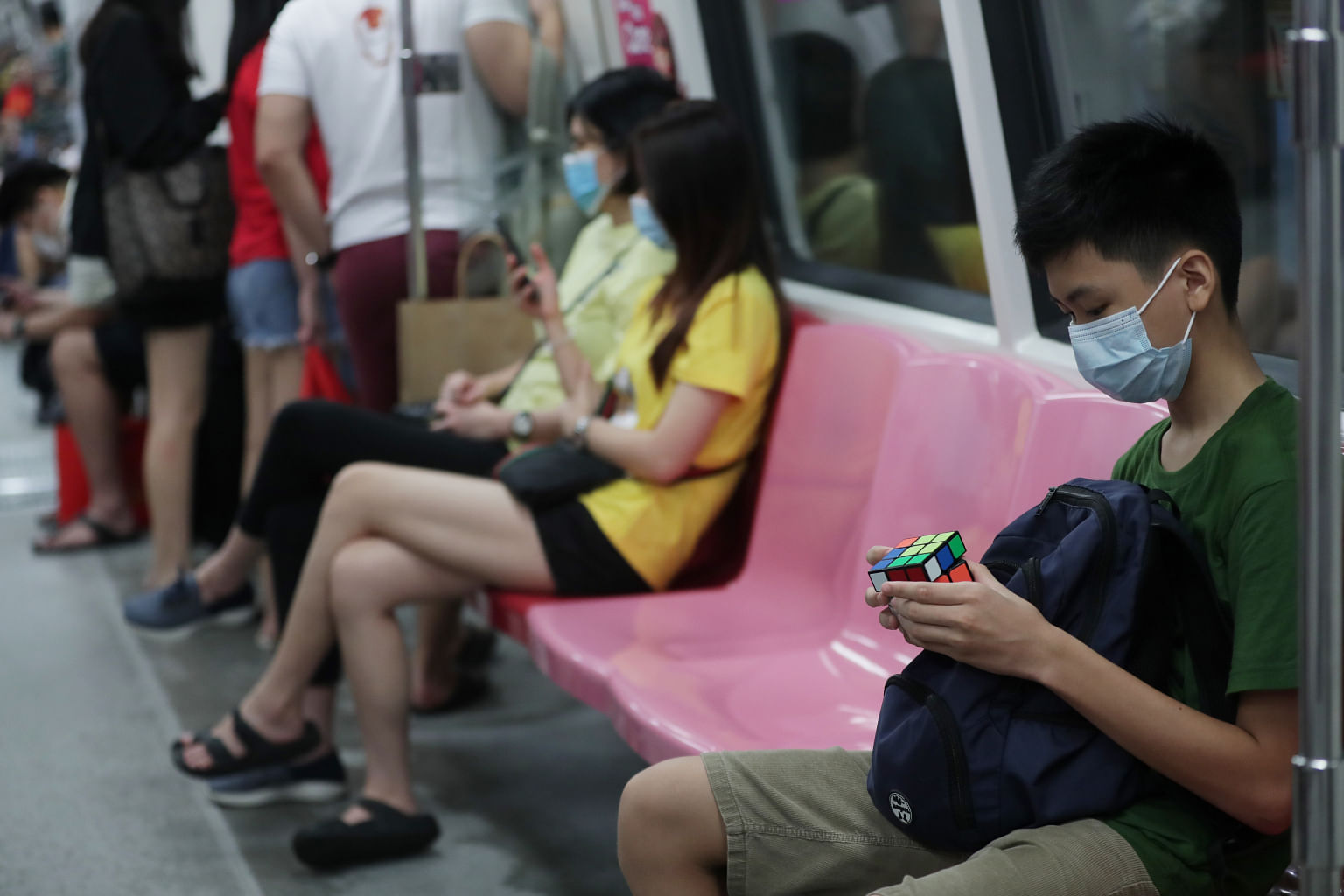SINGAPORE - You wake up with the slightest case of a runny nose. Mental note: Put on a mask before you leave for the airport - not that it's a must, but just to be safe. After breakfast, you whip out Temasek's newest do-it-yourself Covid-19 test kit, bought over the counter at Guardian pharmacy. Everyone at home breathes negative.
You submit the results as part of the advance check-in process. Also required: Proof of the latest vaccine booster shots - updated for fresh variants - that the family got at the polyclinic yesterday.
Over lunch at Changi Airport's new open-air foodcourt, you log on to the Ministry of Education website to confirm that leave has been applied for both children. No more fixed school holidays - the idea still takes some getting used to. You don't need to take leave, though - not since your employer's new outcome-based KPIs, which do not dictate how and where the job gets done.
On the plane, you recline into your economy-class seat, in a cabin now reconfigured to be roomier - or as they used to say back in 2021, "safely distanced". Before takeoff, you double-check the booking for your Bangkok hotel, recommended for its certification of five Covid-safety stars.
It's all systems go - for your first holiday in eight years.
This could be life with Covid-19 endemic - as envisioned and told to Insight by experts across fields spanning infectious disease, public health, education and tourism.
They note the possibility of fundamental changes to how Singaporeans play, heal, study, work and engage with one another.
With the transition to this future bound to be filled with uncertainty and unpredictability; Singaporeans must meet the challenge by being adaptable and versatile.
Dr Adrian W. J. Kuah, director of the futures office at the National University of Singapore (NUS), offers a starting point: Embrace what is coming as "late-Covid-19", rather than "post-Covid-19" - which suggests the unlikely chance of eradicating the virus.
Staying safe
In a national address on Monday, Prime Minister Lee Hsien Loong said he neither expects Covid-19 to disappear nor for it to dominate lives. He outlined a new normal where Singaporeans find ways to carry on with the virus in their midst. This also means accepting local infections and outbreaks from time to time.
Associate Professor Jeremy Lim, director of global health at the NUS Saw Swee Hock School of Public Health, says this acceptance level - or risk threshold of, for instance, the number of yearly deaths - will determine the extent of public health measures.
Dr Oliver Morgan, director of the World Health Organisation's (WHO) department of health emergency information and risk assessment, says governments should adopt a judicious blend of measures, rather than an "on-off switch" alternating between strict and relaxed limits.
Mask wearing is one measure experts wish will no longer be mandated, yet remain as a good habit and social norm. "I hope that we can migrate to how the Japanese wear masks - when they have a cold or flu; and to prevent spread to others," says Associate Professor Alex Cook, who is also from the Saw Swee Hock School.
Professor Leo Yee Sin, executive director of the National Centre for Infectious Diseases (NCID), says testing, contact tracing, isolation, vaccination and social responsibility should remain key strategies.
On vaccines, Professor Paul Tambyah, president of the Asia-Pacific Society of Clinical Microbiology and Infection, hopes the new infrastructure built up by the Covid-19 response can be combined with the yearly flu jab. This would enable what Prof Lim calls "one shot for everything".
Out and about

In social settings, the experts point to urban design and planning as preferred tools to managing Covid-19, compared with distancing restrictions that come at a cost to businesses.
As an alternative to air-conditioning, Prof Lim suggests engineering high ceilings, large open windows and cross-ventilation as natural cooling methods.
Dr Woo Jun Jie from NUS' Institute of Policy Studies, who researches urban policy, says other measures include better air filtration systems, reducing the occupancy load of malls, improving crowd circulation in public transport hubs, and even safe evacuation routes for infected people.
Overseas travel is expected to resume. Last month, the International Air Transport Association said global air travel would bounce back strongly by 2023, surpassing pre-Covid-19 levels. PM Lee said on Monday that visitors would again come to Singapore, and Singaporeans would travel again, if only to countries where the disease is under control.
Tourism consultant Christopher Khoo believes planes and cruise ships will, for some time, continue to be perceived as viral "petri dishes", even as they overhaul systems and safety measures. Vacation tour itineraries and programmes will have to be planned down to the last detail, with slots pre-booked at attractions and eateries, he says.
As PM Lee also predicted, this time in a BBC interview in March: "It won't be like before when you can just buy a ticket, hop onto the plane and go off to Hong Kong or Bangkok or Bali for a weekend."
Rethinking school, work
Experts are also thinking beyond home-based learning and work from home.
Dr Kuah from NUS notes the repercussions of school ceasing to be at a fixed location. "We are looking now at a generation that didn't get to play team sports, experience campfires... First dates, first surreptitious brush of one's hand against another's, forming friendships for life - where will these take place?"
He also warns that teaching could risk becoming even more transactional, and reduced to delivery of content. "How effectively can we educate if we can't make that human connection?"
Last month, Education Minister Chan Chun Sing stressed the need to find new, safe ways for students to keep learning in a physical environment as far as possible.
Professor Paulin Straughan, a sociologist at Singapore Management University, was more sanguine about the future of work.

Should offices increasingly disappear, taking physical meetings with them, the businesses that will thrive are those able to foster cultures centred on strong trust in employees, she says. Done right, this could result in better control over individual time, and even rewarding relationships with co-workers and supervisors.
She feels Singaporeans need to step up as active stakeholders in the community too. "We shouldn't have to rely on safe distancing ambassadors any more."
New frontiers
Dr Woo notes that citizens and policymakers will need to accept that governments do not have all the solutions. Going forward, governments may need to rewrite parts of their policy playbooks.
Prof Leo thinks countries will have to stand together more. "There needs to be equitable access to healthcare, personal protective equipment, vaccines, technology, information sharing, data sharing, surveillance and the ability to ramp up research."
NUS' Dr Lim believes Singapore's health system capacity needs to be bolstered. "Is one NCID enough, or do we need two? The difficulty is, as the saying goes, generals are always fighting the last war. And we don't know what Disease X is going to be."
Disease X is the as-yet-unknown but deadlier pathogen many believe will spawn the next calamitous pandemic.
The WHO's Dr Morgan says that to face down this threat, one area to be urgently improved is humankind's relationship with its surrounding ecosystems.
Adds Dr Kuah: "Some might argue Covid-19, and the inequalities that surfaced in its wake, were due precisely to the way things were, for example, pushing against the planet's resource constraints. This is an opportunity to do something else and to rehabilitate the planet and our societies."












